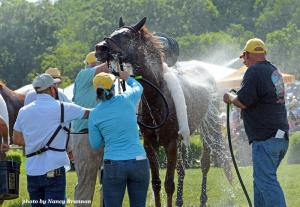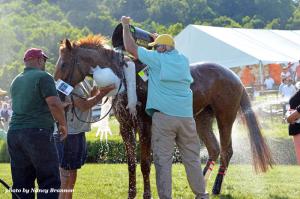From Kentucky Equine Research
Use these tips to keep your horse as comfortable as possible during periods of hot weather.
Dr. Monty McInturff and his crew from Tennessee Equine Hospital, Thompson’s Station, Tenn., worked diligently to keep horses cool at the Iroquois Steeplechase – this year’s races run in June with temperatures at 90°F at Percy Warner Park in Nashville, Tenn. Dr. McInturff had this advice for cooling horses in the heat:
“The heat is something we all have to deal with especially those of us that spend most or all of our days outside. Our horses are no exceptions. Here are a few things to think about in preparation for the summer heat.
“Proper electrolytes and hydration is key prior to exercise. Our horses have more stamina and can handle extreme conditions if they have access to these essentials.
“Proper shade to get out of the direct sun.
“A cool water bath, as well as direct ice on the jugular vein, helps to cool the horse’s core temperature.”
Last year, Kentucky Equine Research staff embarked on a new study comparing several different cooling methods for lowering horses’ body temperatures after exercise. “Elite athletes like racehorses sometimes exercise on hot, humid days, often resulting in high body temperatures that must be lowered quickly before heat-related stressors set in,” KER staff wrote.
Of the five cooling methods they compared – one or more commercial fans while walking out; intermittent application of cold water every three minutes, scraping off excess water; intermittent application of cold water every three minutes, without scraping off excess water; showering continuously with tap water for 30 minutes – the researchers “concluded that showering the horse continuously with a large volume of tap water resulted in the most rapid decrease of both pulmonary artery and rectal temperatures, signifying its effectiveness as a way to achieve cooling in hot, humid conditions.” Researchers also noted in the article that “because large quantities of electrolytes are lost in sweat, electrolyte supplementation becomes a key factor in managing the diets of performance horses.”
KER Article: Takahashi, Y., H. Ohmura, K. Mukai, T. Shiose, and T. Takahashi. 2020. “A comparison of five cooling methods in hot and humid environments in Thoroughbred horses.” Journal of Equine Veterinary Science 91:103130.
Use these tips to keep your horse as comfortable as possible during periods of hot weather.
- Ride early or late in the day to avoid the hottest periods.
- Use cold water hosing or sponging to cool your horse after exercise. It’s not true that pouring cold water over hot muscles will cause cramping. Apply cold water, scrape it off, and pour on more to carry heat away.
- Allow your horse to drink during and after exercise periods. Give him a chance to drink, walk him for a few minutes, offer more water, walk, and continue until he has had all the water he wants.
- Think about your horse’s condition frequently as you ride. If your horse gets hot and sweaty and is breathing hard, ease up until he recovers. Don’t hesitate to cut short a trail ride or jumping lesson; horses can suffer from heat stress and illness just as people can.
- If you accidentally overdo exercise and your horse is still hot and breathing hard several minutes after stopping exercise, make every effort to reduce his body temperature. Get him into the shade, set up a fan if possible, and hose or sponge him with the coldest water you can find. Call a veterinarian if these measures don’t improve his condition pretty quickly.
- With older horses or those in obese or unfit condition, be careful to limit exercise in hot weather. These horses may get overheated more quickly and be less able to lose excess heat than their younger, fitter peers.
- All horses should have access to a salt block. If your horse is working regularly in hot weather, consider using an electrolyte supplement even if you don’t see a lot of sweat, which can evaporate before it becomes visible.
- Be sure your horse is comfortable even when he’s not working. Give him access to plenty of fresh water and a shady spot to rest. Use a fly sheet or fly spray as needed to guarantee he can relax; stamping at flies uses a lot of energy and is hard on legs and hooves. Putting sunscreen on white or light-colored muzzles will keep sensitive skin from getting painfully burned.
- Anhidrosis (not producing enough sweat) is an often overlooked cause of heat intolerance or poor performance. Consult your veterinarian about testing for anhidrosis and possible treatment if you suspect that your horse cannot sweat normally.
Dr. Monty McInturff and his crew from Tennessee Equine Hospital, Thompson’s Station, Tenn., worked diligently to keep horses cool at the Iroquois Steeplechase – this year’s races run in June with temperatures at 90°F at Percy Warner Park in Nashville, Tenn. Dr. McInturff had this advice for cooling horses in the heat:
“The heat is something we all have to deal with especially those of us that spend most or all of our days outside. Our horses are no exceptions. Here are a few things to think about in preparation for the summer heat.
“Proper electrolytes and hydration is key prior to exercise. Our horses have more stamina and can handle extreme conditions if they have access to these essentials.
“Proper shade to get out of the direct sun.
“A cool water bath, as well as direct ice on the jugular vein, helps to cool the horse’s core temperature.”
Last year, Kentucky Equine Research staff embarked on a new study comparing several different cooling methods for lowering horses’ body temperatures after exercise. “Elite athletes like racehorses sometimes exercise on hot, humid days, often resulting in high body temperatures that must be lowered quickly before heat-related stressors set in,” KER staff wrote.
Of the five cooling methods they compared – one or more commercial fans while walking out; intermittent application of cold water every three minutes, scraping off excess water; intermittent application of cold water every three minutes, without scraping off excess water; showering continuously with tap water for 30 minutes – the researchers “concluded that showering the horse continuously with a large volume of tap water resulted in the most rapid decrease of both pulmonary artery and rectal temperatures, signifying its effectiveness as a way to achieve cooling in hot, humid conditions.” Researchers also noted in the article that “because large quantities of electrolytes are lost in sweat, electrolyte supplementation becomes a key factor in managing the diets of performance horses.”
KER Article: Takahashi, Y., H. Ohmura, K. Mukai, T. Shiose, and T. Takahashi. 2020. “A comparison of five cooling methods in hot and humid environments in Thoroughbred horses.” Journal of Equine Veterinary Science 91:103130.









